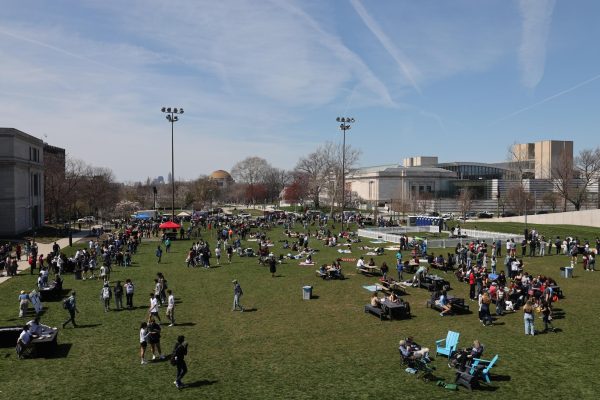Cai: Post-DACA: These are real people
A month has passed since the Trump administration announced the repeal of Deferred Action for Childhood Arrivals (DACA) on Sept. 5. Five more months remain for the Congress to discuss its implementation.
On the day of the announcement, every student, faculty member and staff member of Case Western Reserve University received an email from President Barbara Snyder and Provost W.A. Baeslack, which clearly states that “Dreamers”, those who would have received the benefits from the never-passed DACA, are welcome here. The Hispanic student organization, La Alianza, hosted a protest in front of Adelbert Hall, in which at least one hundred students and faculty took part.
Discussion continues on campus about democracy, freedom and human rights, about what makes this country great and about what has changed. As responsible citizens, we students should continue talking about these topics until we see the country is working for the better, but today I want to talk about people like us.
When I learned from a friend that her loved ones were affected by the termination of DACA, I was quite shocked. “You can always talk about the issue in general, but when you are in the situation, it is so personal and real,” she said.
My friend is half Mexican and half American. Every year she goes back to Mexico City where her family lives. She was raised bilingual; she has enjoyed her mother’s Mexican cooking all her life. When she learned that her best friend might be deported due to the termination of DACA, she felt the indignation equally strongly.
She used the word “disappear” when she thought of her friend being taken away. A best friend might be brutally wiped out from her life merely because one cannot choose where they were born.
I realize that one day we might not be seeing people whom we used to see every day, and there’s no way to know if or when they can come back. That is much like “disappearing”. As a matter of fact, people around us are having loved ones taken and connections crucial to their lives cut off.
One night my friend’s best friend left her car key in the keyhole, and the police came to their house to return it. The entire family was terrified—they could have been deported if the police found out she was “illegal”. It’s crazy that your life can be drastically changed by something as minor as leaving a key in a keyhole.
For us, the termination of DACA is a dangerous notion; for those affected it is life-changing. Paranoia has changed the lives of DACA recipients. Nevertheless, that might be the kind of life some of our classmates are experiencing.
The night before the La Alianza protest, the participants were making signs for preparation. Among them was a first-year student. He was a recipient of DACA. He had a chemistry quiz the next day. He didn’t know if he would be deprived of everything his life was built on, but he had to go back to study.
We don’t know how many more people are just like this student on our campus. We don’t know what the future holds for them, or how they are going to face it.
To DACA recipients, their home country might be as foreign as America is to me. Nevertheless, I speak English. I’m receiving an education that my parents paid for. I had a shuttle to pick me up from the airport, a safe accommodation and hundreds of faculty and staff to make sure my stay is pleasant here.
For DACA recipients, their home country is nothing more than the place they were born. I recollect the stress, homesickness, and loneliness that occasionally attacked me in the past month since moving to the U.S., which were already overwhelming, and I couldn’t even imagine how I would feel were I abandoned alone in Cleveland Hopkins International Airport with nowhere to go. I couldn’t imagine how I could survive in a country where no path has been paved for me, and how my family and friends would feel if I were suddenly taken away without being able to come back. I couldn’t believe that for some students sitting with me in class, this might not be imagination, but reality.
As we protest, write letters to senators and hold discussions, we should pay attention to our fellow students. I believe no one is taking this news well. There must be many like me who are unsettled, disappointed and afraid. The announcement depicts an America different from the one I dreamed of when I excitedly applied for this school.
I’m scared that one day I will not be welcome either. But I still believe in a mixed America. I believe that we should stay together and make a different voice, one that counteracts the Trump administration’s. Make sure the confused have someone to talk to. Make sure no one has to prepare for their tests and go to classes wondering if they are going to be kicked out of the country the very next moment. Make sure every dream is respected.
Yingying Cai is a first-year anthropology major.

















